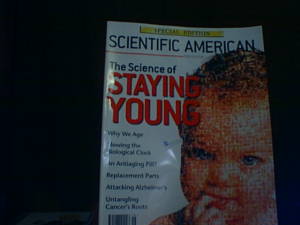Saturday 10 July 2004

|
Pic of the day: Special edition of Scientific American. Eat less or work out more?And die anyway? It is a sign of the times, I believe, that Scientific American is once again publishing a special edition (theme issue) about the fight against old age. It must be breathing down the neck of the American baby boomers now. I think it is 4 years since I wrote about their previous special issue on that topic. In fact, I recognize at least one of the images inside from that issue. Some things don't change. Some do, however. By the time of the previous special issue, there was a brief mention that exercise from middle age upward does add to life length only about as much time as you spend exercising. In this issue, the focus is moved further toward calorie restriction. As the only known way to extend not just average lifespan but also the upper limit, calorie restriction has been studied in life forms from nematodes to Rhesus monkeys. Scientists believe they are on the trail of a drug that may mimic the effect while you can still continue to fill your stomach. The effect, however, is pretty severe even if they manage to refine the drug to be non-toxic. What happens is essentially that your metabolism slows down, which means that YOU slow down. Of course, if you're currently grossly obese, that slows you down too, and calorie restriction may not be such a horrible fate. But at least your brain operates at peak capacity now. With a drug that cranks down metabolism in every cell in your body, the brain will shift into low gears too, which is probably not a good idea. With actual calorie restriction, the body will make its own priorities as to what organs get what, and the brain has a high priority. The genitals have a low priority, so you're not going to have any interest in procreation and the associated recreation. Whether you regard this as a good or a bad thing is up to you. So, calorie restriction means your maximal lifespan is extended, but it will be a life of always being hungry. You won't be fat, but you'll be so skinny you're out and out ugly and people will worry about you. You'll also be cold in temperatures that normal people find comfortable. You're less likely to get cancer, but if you do, you don't have any reserves to get you through a bout of chemotherapy. And even if you stay healthy, you will live more slowly, unable to give that little extra. Then again, for the time being this is the only known way to extend the maximum lifespan of an individual. ***In contrast, exercise will increase your metabolism, so if anything it's likely to slightly decrease your maximal lifespan. On the other hand, it increases your chance of reaching that limit, and in the meantime you will look and feel pretty good. You'll still have to set aside some of your precious time each day, which is wasted unless you actually like exercising; worse than wasted if you dislike it. And of course, if you get under a lorry, it's all for nothing. That's not an entirely theoretical and flippant remark: Accidents are the third leading cause of death for American males, seventh for females. And I don't think crime is included in those figures. If exercise brings you into a macho culture, your risk of accidents and crime will go up rather than down. Of course, there are ways to increase your survival rate without going to any of these extremes, but then again the increase won't be extreme either. A loving spouse will make you more healthy (but although you live longer, it may not feel as long as being single...). This is particularly true for men, but also for women with a younger husband. Even a pet will reduce the risk of cardiovascular trouble. Meditation improves mood, immune system, and blood pressure. For extroverts, time spent with your friends will have a similar effect. Participating in idealist and especially religious activities not only prolongs your life but helps your brain stay clear for longer; the mechanism for this is unknown. You'd think religious people would be the first to joyfully cross over the River, but in truth they dramatically outlive their secularized compatriots. My best guess is a combination of social network and less stress. Perhaps prayer has a similar effect as meditation. Sooner or later there will be research on prayer even by serious scientists, because inquiring minds need to know. So, anyway: Pick your poison. Or rather, stay off poison. This is probably the easiest, most comfortable and cheapest way to live a longer and healthier life. |
Yesterday <-- This month --> Tomorrow?